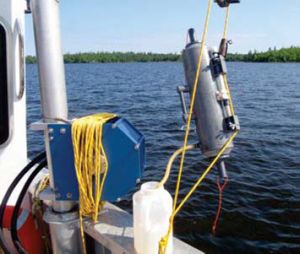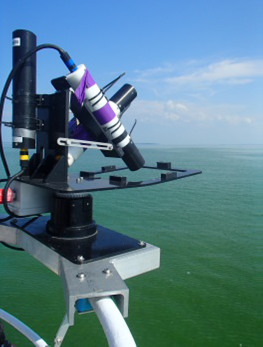 Niskin Bottle is used to collect water samples from discrete depths for chemistry analysis (ECCC photo)The science team from Environment and Climate Change Canada (ECCC) was back on the lake in September for their fall intensive sampling, rounding out their work for the entire summer. The ECCC science program aims to develop a framework to assess and predict the ecological response of the lake (e.g., algae blooms) to potential nutrient load reductions.
Niskin Bottle is used to collect water samples from discrete depths for chemistry analysis (ECCC photo)The science team from Environment and Climate Change Canada (ECCC) was back on the lake in September for their fall intensive sampling, rounding out their work for the entire summer. The ECCC science program aims to develop a framework to assess and predict the ecological response of the lake (e.g., algae blooms) to potential nutrient load reductions.
Ongoing water quality and other data were collected from 30 stations across the lake. Issue-specific work was also undertaken to better characterize:
- the role of nutrients being released from the lake bottom sediments (“internal loading”);
- algal community composition;
- toxin production from blue-green algae (“cyanobacteria”).
Data collected from light irradiance sensors in several locations on the lake are also being used to better validate information from satellite images – the purpose of which is to improve the ability to use satellite remote sensing information to understand the extent and types of algae blooms across this vast lake.
Field crews, working with local cottage owners, also continued sampling for a study to better understand the potential for nutrients from cottages and other shoreline development to contribute to algal blooms.
 Irradiance sensor being used to validate satellite-derrived information and tools to assess algae blooms and algae types in a project led by Dr. Caren Binding(ECCC photo)In addition, this year’s work included expanded monitoring of nutrients in tributaries entering the lake. Included in this is a partnership with Trent University researchers to study the nutrients coming from tributaries and atmospheric deposition, as well as the impact of land use on nutrient loadings.
Irradiance sensor being used to validate satellite-derrived information and tools to assess algae blooms and algae types in a project led by Dr. Caren Binding(ECCC photo)In addition, this year’s work included expanded monitoring of nutrients in tributaries entering the lake. Included in this is a partnership with Trent University researchers to study the nutrients coming from tributaries and atmospheric deposition, as well as the impact of land use on nutrient loadings.
On the Rainy River, water chemistry monitoring was ongoing throughout the year with the citizen collection program. Additionally, automated samplers were used in the Pinewood River (which flows into the Rainy River) to better characterize nutrients from this river.
ECCC continues to work with local communities to build relationships and look for innovative ways to communicate and share results. For further information on ECCC’s Science program, please contact:
